At the heart of Elizabeth Metis Settlement (EMS), a new initiative is taking root, fostering food security, economic growth, and environmental sustainability. The Elizabeth Metis Settlement Greenhouse Project has become a beacon of community-led action, integrating renewable energy projects and sustainability consulting to build a future where the Settlement can thrive in harmony with nature.
Known as “Métis Roots,” the greenhouse project is a testament to the power of Settlement partnerships, indigenous community engagement, and energy efficiency solutions, showcasing how traditional knowledge and modern tec
hnology can blend to create a sustainable agricultural model. This initiative addresses food insecurity, promotes self-sufficiency, and offers educational opportunities to the local population, all while aligning with Environmental, Social, and Governance criteria and the Sustainable Development Goals.
A Vision of Food Security and Sustainability
The core objective of the Métis Roots is to address the growing concern of food insecurity within the Settlement. With over 600 members, the Settlement faces unique challenges related to access to fresh, nutritious, and culturally relevant food. By cultivating a wide range of vegetables and herbs—such as tomatoes, cucumbers, lettuce, and zucchini—the greenhouse is p
roviding local produce and significantly reducing the need for external food sources.
This project is an example of sustainability consulting in action, where strategic planning, community engagement, and environmental considerations have come together to create a model that will stand the test of time. The project embraces energy efficiency solutions, utilizing modern technologies to reduce water usage and energy consumption, ensuring minimal environmental impact.
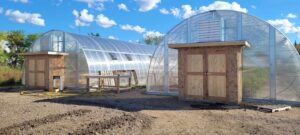
Energy Efficiency and Renewable Energy Integration
Energy efficiency lies at the heart of the greenhouse’s design. By using energy-efficient technologies such as heat pumps, energy-saving lighting, and advanced irrigation systems, the project minimizes its environmental footprint. The team is also exploring renewable energy projects, such as the potential integration of solar panels to power greenhouse operations, further reducing reliance on external energy sources.
These energy-efficient upgrades align with Canada’s ESG criteria and the community’s commitment to contributing to the national Sustainable Development Goals. The greenhouse project supports both SDG 12: Responsible Consumption and Production and SDG 13: Climate Action by promoting a self-sufficient, eco-friendly food system.
Community Partnerships and Indigenous Engagement
One of the key factors driving the success of the greenhouse project is its strong foundation in Settlement partnerships. The project was made possible through collaborations with multiple stakeholders, including local govern
ment, technical consultants, and funding partners. This collaborative effort demonstrates the importance of indigenous community engagement in driving successful, long-term projects.
Janeen Longjohn, our local Settlement worker, has played a pivotal role in ensuring the success of the greenhouse. With the support of Project Manager Deloris Courtepatte and Technical Consultant Shelley Phillips, Janeen has managed to grow over 2,000 plants, which have been sold locally at the Settlement. Settlement members, including Amy Moore, who cleared the land, and volunteers who helped with planting potatoes, have also contributed to the project’s success.
The greenhouse has become more than just a food production facility; it’s a hub of education and empowerment. Local students, guided by Janeen and the EMS Education & Employment Councillor, Lori Desjarlais, participate in training modules, helping to instill in the youth a deep understanding of sustainable agriculture. This initiative nurtures a new generation of leaders, equipped with the skills to continue the legacy of community-led sustainability.
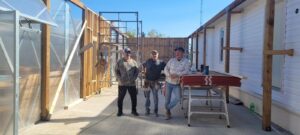
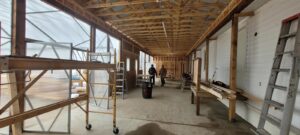
Economic and Social Impact
Métis Roots is a significant success story and driver of economic empowerment for Elizabeth Metis Settlement. The sale of produce generated $960 during its first sale, with all proceeds reinvested into the Settlement. This reinvestment strategy, alongside potential future income streams such as selling produce to local markets, will create long-term economic benefits for the Settlement.
Furthermore, the project has created local employment opportunities. As the project grows, it is expected to stimulate the local economy further by offering small business opportunities, such as selling produce at farmers’ markets and the Settlement’s new gas station in Cold Lake.
By fostering community pride, the project has strengthened social bonds within the Settlement. The sense of ownership and shared responsibility cultivated through the greenhouse project highlights the social pillar of ESG, emphasizing the role of the community in sustainable development.
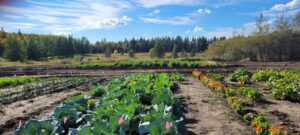
Challenges and Future Plans
Like any ambitious project, the greenhouse faces challenges. One such challenge is the need for expanded infrastructure, such as a bunkhouse and watering systems, to support the growing scale of operations. Funding has been secured from the FCC AgriSpirit Fund, and more funding is being sought to cover the cost of these vital upgrades.
In addition, the project plans to extend its outreach through a greenhouse naming contest and increase engagement with the Settlement through workshops and educational programs. These initiatives will strengthen the connection between the greenhouse and the Settlement, ensuring long-term sustainability and growth.
The project team also aims to enhance its existing infrastructure to serve as additional storage and storefronts. With plans to integrate traditional Métis medicines and herbs into the crop selection, the greenhouse will continue to celebrate and preserve Métis cultural heritage while supporting environmental stewardship.
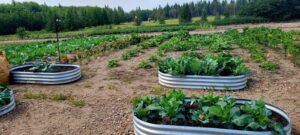
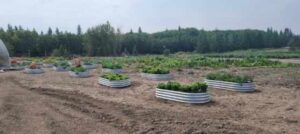
A Sustainable Future
The Elizabeth Metis Settlement Greenhouse Project is more than a local food initiative—it’s a model for sustainable community development. By embracing energy efficiency, promoting renewable energy projects, and fostering Settlement partnerships, this project is setting the stage for a self-sufficient and resilient future for the Metis Settlement.
The project’s success demonstrates that when community engagement, funding procurement strategies, and sustainability consulting come together, the results are powerful and long-lasting. As the project continues to grow, it will serve as an inspiring example of how Indigenous communities can lead the way in sustainable development and environmental stewardship.



























































